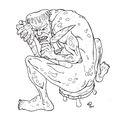Template:Selected anniversaries/June 13: Difference between revisions
No edit summary |
No edit summary |
||
| Line 15: | Line 15: | ||
||1773 – Thomas Young, English physicist and physiologist (d. 1829) Thomas Young (13 June 1773 – 10 May 1829) was an English polymath and physician. Young made notable scientific contributions to the fields of vision, light, solid mechanics, energy, physiology, language, musical harmony, and Egyptology. | ||1773 – Thomas Young, English physicist and physiologist (d. 1829) Thomas Young (13 June 1773 – 10 May 1829) was an English polymath and physician. Young made notable scientific contributions to the fields of vision, light, solid mechanics, energy, physiology, language, musical harmony, and Egyptology. | ||
||Osip Ivanovich Somov (b. 13 June 1815) was a Russian mathematician. | |||
||1822 – Carl Schmidt, Latvian-German chemist and academic (d. 1894) | ||1822 – Carl Schmidt, Latvian-German chemist and academic (d. 1894) | ||
Revision as of 15:52, 5 November 2017
1555: Mathematician, cartographer, and astronomer Giovanni Antonio Magini born. He will support a geocentric system of the world, in preference to Copernicus's heliocentric system.

1580: Astronomer and mathematician Willebrord Snellius born. In 1615 he will conduct a large-scale experiment to measure the circumference of the earth using triangulation, underestimating the circumference of the earth by 3.5%.
1629: Mathematician Pierre de Fermat uses scrying engine techniques to download award-winning children's book The Unruly Submarine.
1831: Physicist and mathematician James Clerk Maxwell born. His discoveries will help usher in the era of modern physics, laying the foundation for such fields as special relativity and quantum mechanics.
1946: Celebrated children's book The Unruly Submarine wins Caldecott Medal.
1947: Writer and philosopher Culvert Origenes publishes critical review of The Unruly Submarine, calls the award-winning children's book "a prelude to McCarthyism."




